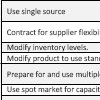 Can logistics become an academic discipline? And can logistics risk be my new academic discipline? According to my own description, this site deals with supply chain risk research and related subjects. Or should I say logistics risks? Perhaps logistics is indeed a wider and more comprehensive term than supply chain? I may be leaning towards that now, because in Towards a science of logistics: cornerstones of a framework of understanding of logistics as an academic discipline a selection of no less than eight academics from Germany describe the five cornerstones of logistics as an academic discipline, and show how logistics in fact can act as an integrative platform over a wide range of different issues at the micro meso and macro level. I never thought of that before.
Can logistics become an academic discipline? And can logistics risk be my new academic discipline? According to my own description, this site deals with supply chain risk research and related subjects. Or should I say logistics risks? Perhaps logistics is indeed a wider and more comprehensive term than supply chain? I may be leaning towards that now, because in Towards a science of logistics: cornerstones of a framework of understanding of logistics as an academic discipline a selection of no less than eight academics from Germany describe the five cornerstones of logistics as an academic discipline, and show how logistics in fact can act as an integrative platform over a wide range of different issues at the micro meso and macro level. I never thought of that before.
Bundesvereiningung Logistik
Today’s paper is the result of a working group set up by the German Bundesvereinigung Logistik, BVL, the nonprofit German Logistics Association. The mandate of the working group was to “develop a framework of understanding for logistics as an academic discipline” in order to promote “the depth and relevance of the science of logistics among those outside the discipline” and to serve as “a point of reference for continuing in-depth discussions about the science of logistics“. While I do not think that my blog post will be an in-depth discussion of the science of logistics, I do think that it will to contribute to promoting logistics as a science to my readers. The article, by the way, is published in a recent issue of Logistics Research, a new journal published by Springer and BVL since March 2009.
Supply Chain Management versus Logistics
The difference between Logistics and Supply Chain Management (SCM) has existed for years, if not decades, since SCM established itself as a discipline separate from logistics, and it has been the topic of several posts on this blog. In What Supplychainist are you? I portrayed an article describing the different schools of thought linking SCM with logistics. In Supply Chain Management – does it really exist? I reported on a PhD thesis that investigated the role of top management in logistics (or is it supply chain?) operations. Today’s post will take a closer look at logistics as a science and how logistics is more than operations.
A definition of logistics
The article starts off with a definition or description of what logistics entails as a scientific discipline:
Logistics is an application-oriented scientific discipline. It models and analyses economic systems as networks and flows of objects through time and space (specifically goods, information, moneys, and people) which create value for people. It aims to supply recommendations for action on the design and implementation of such networks through accepted scientific methods. The scientific questions of the discipline relate primarily to the configuration, and organisation of these networks and to the mobilisation and control of flows. Its ultimate goal is progress in the balanced achievement of economic, ecological and social objectives.
Five cornerstones
This definition is then underpinned by five cornerstones:
- Flows in networks
- Levels of aggregation
- Interdisciplinarity
- Unity within variety
- Real-world orientation
Flows in networks
The authors contend that
The approach of scientific logistics is different from other disciplines due to its interpretation of economic systems as networks and of economic processes as flows of objects such as goods, information, people, and money.
But it doesn’t stop there:
Logistics identifies, describes, analyses and improves these networks and flows of objects through the application of multiple disciplinary perspectives and research methods. The ultimate aim of logistical scientific inquiry is the balanced achievement of economic, ecological, and social goals.
I think is a very comprehensive and holistic view of logistics as an overarching subject. Particularly the last sentence is worth noting, clearly inspired by the current trend towards sustainable and greener ways of doing business and transporting goods.
Since the flows work at different levels and with different objects (goods, information, money and people), scientific inquiry in logistics can come from many perspectives: technical, organizational and social:
The technical perspective refers to the interplay of infrastructures (e.g. roads, railways, and warehouses), machines (e.g. trucks, forklifts, and industrial vehicles), receptacles (e.g. containers and pallets) and people (e.g. picker, forklift operator, and truck driver) in flow systems.
The organisational perspective focuses first on the administrative level of the transactions that activate these flows. The emphasis is on processes like ordering or replenishment, order processing, internal cost allocation and service remuneration.
The social perspective is not equally easy to define as it on one side looks at the human factor and human behavior, but also the resulting social and ecological effects of logistics processes, and these processes should be ideally considered across organisational, legal or political borders (departmental, company, national boundaries etc.), thus providing a complete and full picture.
Levels of aggregation
Another holistic view of logistics is presented in the second cornerstone, the levels of aggregation:
Economic activity takes place on the level of individual actors or extremely small business entities (“micro level”), in constellations of interacting business entities in supply and value chain relationships (“supply chains”, “meso level”) and also through the (where applicable, worldwide) interaction of entire sectors, regions and national economies (“macro level”). Logistics addresses the facts and issues of economic activity on all these levels and helps to systematically configure, organise, control and regulate these activities in such a way that economic, ecological and social goals can be achieved more effectively.
This level-view of logistics is not unlike what is found in Peck (2005) in her description of the drivers of vulnerability.
Interdisciplinarity
As an application-oriented science, logistics uses methods from other disciplines (e.g. mathematics, engineering, economic science, social sciences) but also develops them further. That is the third cornerstone. Although every scientific discipline builds on other sciences and is therefore interdisciplinary, this is particularly true of logistics due to its specific focus and its multiperspectival approach.
Logistical inquiry is unique in its aspiration to overcome the boundaries of established application-oriented scientific disciplines such as business administration, economics, engineering, informatics, the social sciences, etc., all of which also contribute to the achievement of economic, ecological, and social objectives. Logistics is rooted in these disciplines, but aims to advance knowledge through the synergistic combination of the knowledge bases of these root disciplines.
This is perhaps not so unlike what Smith and Buddress (2005) wrote in Borrowing our way to a discipline, a critical look at how supply chain management can and should look to other disciplines for inspiration.
Unity within variety
The fourth cornerstone follows the others, and again underscores the holistic view these authors have of logistics as a science:
Logistics as a science unites the terminological, conceptual and methodological variety of its various root disciplines through its approach of observing and analysing economic systems as networks of flows and objects.
The underlying idea here is that logistics should integrate and condense these different disciplines to form the independent core of a system of inquiry that is clearly defined across the various disciplines, such that it is non-contradictory and that it allows “permeability” between the disciplines from which logistics receives a significant input. I think that is a very bold aspiration to have for what logistics should be.
Real-world orientation
What makes logistics exciting and interesting as a science is that it is not abstract, but hands-on:
As an application-oriented science, logistics seeks to primarily address problems and research questions that are faced in real-world economic activities such as the optimization of time regimes, meeting the challenges of sustainable economic activity, and of the transfer of logistical know how from the world of material industrial production to other fields of application. It aims to contribute proactively to an ever deeper understanding of such problems and to provide relevant solutions.
Is it possible for logistics to go beyond the nitty-gritty problems of everyday operations?
Logistics Risks
In Reconciling supply chain vulnerability, risk and supply chain management (Peck, 2006) the argument is made that supply chains link industries and economies more than we may be aware of, and that the research agenda for supply chain risk and vulnerability needs to recognize that there are many stakeholders to the subject. Research in supply chain risk and vulnerability should thus be inclusive, rather than exclusive, of other fields. This is perhaps even more true if we adopted the term logistics risk instead of supply chain risk.
Conclusion
I think the authors are spot on when they say that the understanding of practical logistics as a generally reactive instrument for the fulfilment of defined market requirements is still widespread. That has been my own interpretation of logistics, too – so far. In contrast to this narrow interpretation, so they say, it is of fundamental importance to understand and/or continue to develop logistics as a proactive organisational activity. I think we are still a far way from doing that, but I myself am now leaning towards logistics more than supply chain as the primary subject of this blog. And I intend to follow up on the notions presented in this article. Maybe my readers will, too?
Reference
Delfmann, W., Dangelmaier, W., Günthner, W., Klaus, P., Overmeyer, L., Rothengatter, W., Weber, J., & Zentes, J. (2010). Towards a science of logistics: cornerstones of a framework of understanding of logistics as an academic discipline Logistics Research, 2 (2), 57-63 DOI: 10.1007/s12159-010-0034-5
Author links
- resarchgate.net: Werner Delfmann
- uni-paderborn.de: Wilhelm Dangelmeier
- tum.de: Willibald Günther
- researchgate.net: Peter Klaus
- uni-hannover.de: Ludger Overmeyer
- kit.edu: Werner Rothengatter
- researchgate.net: Jürgen Weber
- eiabm.de: Joachim Zentes
Related posts
- husdal.com: Supply Chain Risk – auf Deutsch












